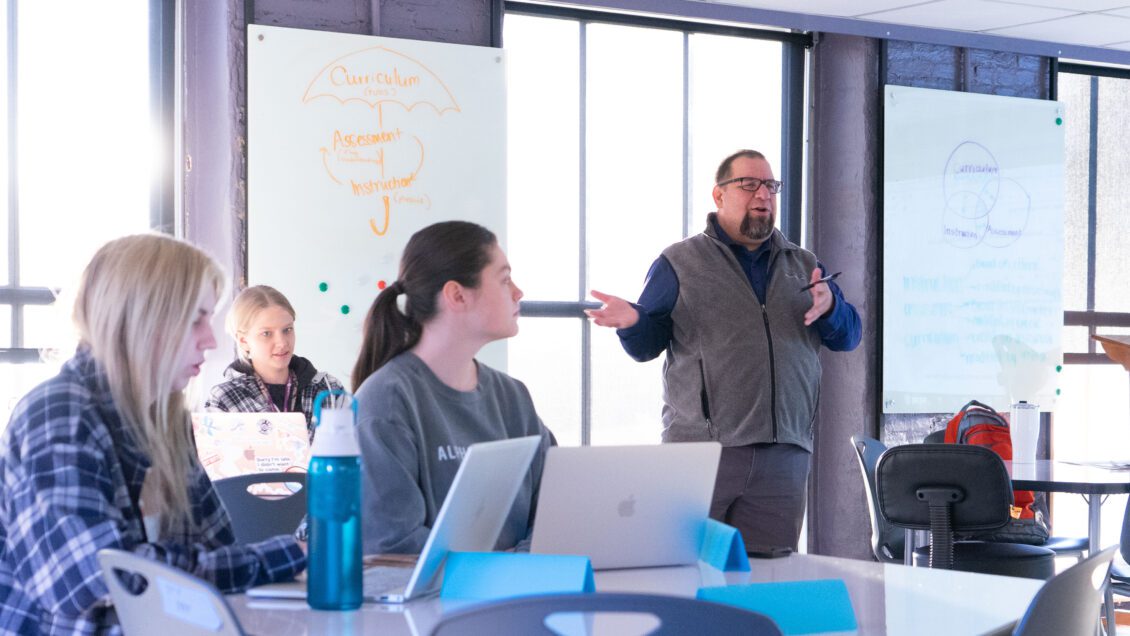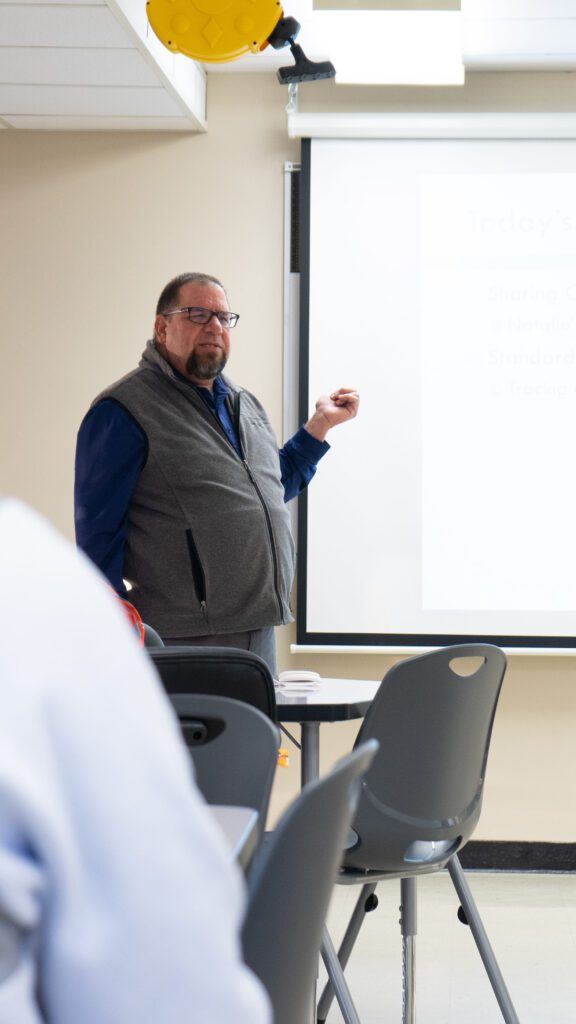
Andy Tyminski serves as a professor in the Department of Teaching and Learning, and he sincerely believes that everyone can learn and understand mathematics. He likes to think that much of his time in class is spent dispelling math myths including “mathemagics,” which is used to describe math as a trick with no reasoning behind it other than being told “this is how we do it.”
We caught up with Tyminski to talk about his approach to teaching prospective elementary mathematics teachers, how a teacher early in his life eventually inspired him to become an educator and what he likes to do when he’s not preparing future math teachers.
What is your teaching philosophy?
I believe everyone is a “math person.” In fact, math is supposed to make sense. I want my prospective elementary mathematics teachers to teach mathematics so that there is a logical reason for all of the rules and procedures that we teach.
My first goal for my prospective teachers is to help them see and understand the “why behind the what” in mathematics. My second goal is for them to understand how children learn mathematics when given the opportunity to solve problems; to know the strategies children are most likely to develop and use and in what hypothetical order. Finally, I want my students to engage in the work of teaching in my mathematics methods course.
I design my course around representations, decompositions and approximations of the practice of teaching mathematics. I provide video for the students to examine authentic examples of teaching. I help them decompose complex practices into smaller parts that can be considered, practiced and then recombined. I also provide opportunities to examine authentic student work and respond to it as a teacher would.

What is the most rewarding and most challenging aspect of teaching for you?
The most difficult part of my teaching is that there is just not enough time to fully prepare my future teachers for everything they will face. In my methods course, I try to prepare them for the work of teaching mathematics, but there is no way to cover everything. As a result, I use a teach-someone-to-fish approach rather than a give-someone-a-fish approach.
I mostly limit my content to numbers and operations because it comprises 70% of what is taught in elementary school. This means I don’t often get to talk about teaching geometry, measurement or data analysis in my course. My hope is they understand the process and can adapt it to the different content they are required to teach.
The most rewarding part of my teaching is when my prospective teachers tell me they are no longer afraid or nervous about teaching math as a result of my work with them. Equally rewarding is when alumni reach out to me after teaching for a few years to tell me how much they love teaching math. People become elementary education majors because they love kids and not because they love to teach fractions. Helping them to either tolerate or love teaching math is super rewarding for me.
When did you know that the field of education was for you?
When I was an undergraduate engineering/computer science major I really did not understand how the courses I was taking were preparing me to enter those careers. As a result, I was really uninterested in learning them and as you might guess, did not do very well.
One day, I was watching TV in my dorm room when I saw a teaching recruitment commercial, and it occurred to me that I could be really good at teaching. After an encounter with my former 4th grade teacher, I transferred to Buffalo State College to be an elementary education major. My first class was mathematics for elementary teachers and everything the professor said in that first class seemed relevant to me as a future teacher. I found myself excited about learning for the first time I had started college. This is the moment when I knew education was where I wanted to be.

What was this encounter that sparked your interest?
Bruce Coville was my 4th grade teacher, and he helped me realize I wanted to be a teacher. He was an amazing elementary teacher and helped me develop my love of math and literature. I have many fond memories of my time in his classroom. While I was a student, Mr. Coville was working on becoming a published author. He had written one book already and he would often read us the stories or manuscripts he was working on. He eventually left teaching to become a full-time author.
During one of my winter breaks in college as I was wondering what I was going to do with my life, one of my friends called to tell me Mr. Coville was speaking at one of the local elementary schools and that we should go see him. We went to his talk and afterwards he held a book signing. We waited in line, letting people cut in front of us until we were the only ones left. When he asked what he could do for us, my friend Tommy said to him, “We’re alumni!” He immediately identified us both. After talking with him for about 20 minutes, I was sure that becoming a teacher was the right thing for me to do.
What do you like about the College of Education?
I work with amazing faculty in the College of Education and especially in the elementary education program area. I’ve been here for 13 years and though some of the faces have changed, it seems every time we hire someone new in elementary education. they turn out to be just as caring, flexible, talented, helpful and intelligent as the person they replace. My job would not be what it is without my friends and colleagues. My students are pretty awesome, too!
What do you enjoy doing when you are not teaching?
When I’m not teaching or working on my research, I try to keep busy. I play golf when I can and am an avid gamer (RPG and PS4). I have a soon-to-be 7-year-old son who keeps me pretty busy playing Pokémon and building Legos and an amazing wife with whom I like to travel and watch TV and movies.
Get in touch and we will connect you with the author or another expert.
Or email us at news@clemson.edu
